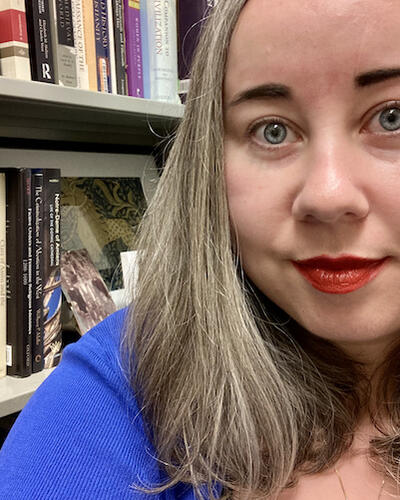Yvonne Seale has been a member of the Geneseo faculty since 2016.
Professor Seale is a historian of medieval women and the social history of religion, with a particular focus on the history of the Premonstratensian Order in twelfth- and thirteenth-century France. At Geneseo, she teaches courses on medieval and digital history, and is a Faculty Affiliate with the Center for Digital Learning.
Her writing has appeared in publications such as the Journal of Medieval Monastic History, Medieval People, Revue d’histoire ecclésiastique, and The Public Domain Review. Her edition of the thirteenth-century cartulary of Prémontré, co-edited with Heather Wacha, was published in 2023. She is presently at work on a monograph exploring the history of medieval Premonstratensian women.
She is the recipient of the Teaching Association for Medieval Studies Teaching Award for College Educators, 2019-2020, and of the SUNY Chancellor's Award for Excellence in Teaching, 2023.
You can follow Professor Seale on Mastodon @yvonne or read about her latest research at her blog. Use the links below to learn more about her publications, or to see which classes she's teaching this semester.

Spring 2024
I am on sabbatical leave until August, 2024.
Curriculum Vitae
Education
Ph.D. in History, The University of Iowa (2016)
M.Litt. in Medieval History, University of St Andrews, Scotland (2008)
B.A. (Hons.) in History, Ancient History, and Archaeology, Trinity College Dublin, Ireland (2006)
Select Publications
The Cartulary of Prémontré. Co-edited with Heather Wacha. Medieval Academy Books Series 118. Toronto: University of Toronto Press, 2023
“Communities of Medieval Women Religious and Their Landscapes,” in Janet Burton and Kimm Curran, eds., Medieval Women Religious, c.800- c.1500: New Perspectives, Studies in the History of Medieval Religion 52 (Woodbridge: Boydell and Brewer, 2023), 166-181.
“The Cartulary of Prémontré: People, Places, and Networks from Medieval to Digital”, in Medieval People: Social Bonds, Kinship and Networks 36 (2022), 353-372. Co-written with Heather Wacha.
"Spare No Scrap. A Piece of Binder’s Waste as Evidence for Institutional Development at the Abbey of Prémontré in the Thirteenth Century" in Revue d'Histoire Ecclésiastique, 116:1/2 (May/June, 2021), 5-31. Co-written with Heather Wacha.
"History in Ruins: The Changing Fates of One of France's Grandest Castles," in History Today 69:9 (September 2019), 76-83.
"The Multi-Cultural Middle Ages: An Annotated Bibliography for Teachers" in The Once and Future Classroom: Resources for Teaching the Middle Ages Vol. 14:1 (Fall 2017).
"Well-Behaved Women? Agnès of Baudement and Agnès of Braine as Mediators and Patrons of the Premonstratensian Order", in the Haskins Society Journal: Studies in Medieval History, Vol. 28 (2016), 101-117.
"George Washington: A Descendant of Odin?", in The Public Domain Review, February 8, 2017.
"Imagining Medieval Europe in the College Classroom," in Studies in Medieval and Renaissance Teaching, Vol. 23:1 (Spring 2016), 95-105.
"De Monasterio Desolato: Politics and Patronage in an Irish Frontier Convent," in The Journal of Medieval Monastic Studies, Vol. 4 (2015), 21-45.
"Précis of the 2014 Barry Prize Winner: Loughsewdy alias Plary: a Cistercian Nunnery Reconsidered", in Eolas: The Journal for the American Society of Irish Medieval Studies Vol. 8:1 (2015), 135-41.
"Family and Finances in Fifteenth-Century Dublin" in History Ireland Vol. 22:3 (May/June 2014), 16-19.
Classes
-
HIST 211: Europe in the World, 300-1000
A broad study of the history of Europe and the Mediterranean basin from the late Roman Empire through to the Age of the Vikings, with an emphasis on how early medieval peoples grappled with complex issues of power, faith, gender, identity, and cultural interaction. Uses texts, images, and material culture to explore Europe and its links with the wider world.
-
HIST 440: Top: Urban Life in Middle Ages
This course focuses on an in-depth study of a particular topic in European history. Topics could be defined either by time, space or theme. The World Wars, nationalist movements, and the scientific revolution are possible topics areas that might be offered.